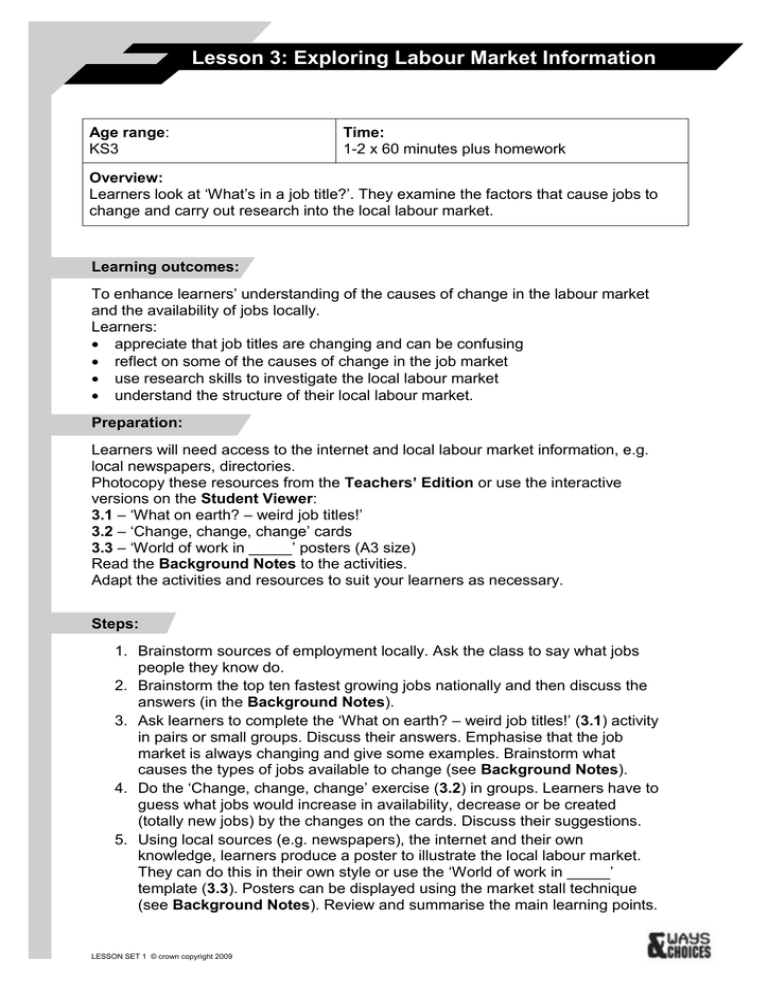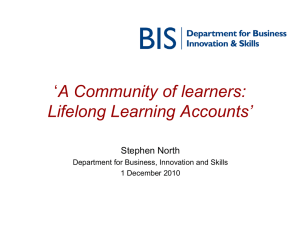Lesson 3: Exploring Labour Market Information
advertisement

Lesson 3: Exploring Labour Market Information Age range: KS3 Time: 1-2 x 60 minutes plus homework Overview: Learners look at ‘What’s in a job title?’. They examine the factors that cause jobs to change and carry out research into the local labour market. Learning outcomes: To enhance learners’ understanding of the causes of change in the labour market and the availability of jobs locally. Learners: appreciate that job titles are changing and can be confusing reflect on some of the causes of change in the job market use research skills to investigate the local labour market understand the structure of their local labour market. Preparation: Learners will need access to the internet and local labour market information, e.g. local newspapers, directories. Photocopy these resources from the Teachers’ Edition or use the interactive versions on the Student Viewer: 3.1 – ‘What on earth? – weird job titles!’ 3.2 – ‘Change, change, change’ cards 3.3 – ‘World of work in _____’ posters (A3 size) Read the Background Notes to the activities. Adapt the activities and resources to suit your learners as necessary. Steps: 1. Brainstorm sources of employment locally. Ask the class to say what jobs people they know do. 2. Brainstorm the top ten fastest growing jobs nationally and then discuss the answers (in the Background Notes). 3. Ask learners to complete the ‘What on earth? – weird job titles!’ (3.1) activity in pairs or small groups. Discuss their answers. Emphasise that the job market is always changing and give some examples. Brainstorm what causes the types of jobs available to change (see Background Notes). 4. Do the ‘Change, change, change’ exercise (3.2) in groups. Learners have to guess what jobs would increase in availability, decrease or be created (totally new jobs) by the changes on the cards. Discuss their suggestions. 5. Using local sources (e.g. newspapers), the internet and their own knowledge, learners produce a poster to illustrate the local labour market. They can do this in their own style or use the ‘World of work in _____’ template (3.3). Posters can be displayed using the market stall technique (see Background Notes). Review and summarise the main learning points. LESSON SET 1 © crown copyright 2009 Lesson 3: Exploring Labour Market Information Assessment opportunities: 1. Ask questions to check that learners understand the four main factors that cause job change. 2. Ask learners to talk about their own attitude to job status, e.g. Would you rather be a barrister or a sludge manager (in a water company)? Look for evidence that they are aware of their needs, interests, skills and values. 3. Discuss with learners the criteria they could use to assess the world of work posters that they have produced. Ask them to use these criteria when they are visiting each other’s stalls and afterwards to give feedback to the stallholders on what they did well. LESSON SET 1 © crown copyright 2009 Background notes Answers to ‘Top Ten Growing Jobs of 2009’ Ten jobs predicted to experience the most growth throughout 2009: 1. Engineer 2. Environmental consultant 3. Cosmetologist (Botox and fillers expert!) 4. Public relations specialist 5. Human resources professional 6. Advertising executive 7. Teacher/assistant 8. Accountant 9. Counsellor 10. Data communications analyst For other lists and an explanation of these trends go to http://msn.careerbuilder.co.uk/Article/MSN-212-Job-Search-Top-10-Jobs-of-2009/ Answers to ‘What on earth? – weird job titles!’ Space consultant (estate agent) Ambient replenishment controller (shelf stacker) Revenue protection officer (ticket inspector) Foot health gain facilitator (chiropodist) Head of verbal communications (secretary) Technical horticultural maintenance officer (gardener) Flueologist (chimney sweep) Dispatch services facilitator (post room worker) Head of services, infrastructure and procurement (caretaker) Knowledge navigator (teacher) Here are some further suggestions: Hygiene operative (road sweeper) Customer adviser (bank clerk) Close protection officer (body guard) Milliner (hat designer) Large goods vehicle operative (lorry driver) Literature manager (librarian) Some factors that cause jobs to change include: political changes, e.g. a policy that everyone has to have the flu jab means we would need more nurses economic changes, e.g. a recession means that people would not spend money on non-essential services and goods such as paying for a photographer for a wedding social changes, e.g. people living longer means we need more care workers LESSON SET 1 © crown copyright 2009 technological changes, e.g. the sending of emails and texts instead of letters means that we need fewer postal workers Suggestions for the ‘Change, change, change’ exercise Change A mobile phone that never needs recharging A ban on owning second homes It becomes compulsory to learn to speak French 80% of all people work from home A ban on eating meat Education until age 21 becomes compulsory for everyone A new drug that means you never need to clean your teeth! The law changes so people can get married at 14! Jobs that might increase in numbers Mobile phone designers Jobs that might decrease in numbers Phone charger makers Holiday reps and travel agents since people couldn’t go to their own holiday homes French teachers and trainers, translators, writers, website designers Cleaners, estate agents, furniture shop workers Other language teachers because people might not have time to learn another language! Computer sales people, IT Train drivers, motorway technicians, tax advisers, service station workers, social networking site taxi drivers, bus drivers, designers civil engineers who design roads Dieticians, food technicians, Butchers, some farmers, chefs, vegetarian food food factory workers, writers and café owners abattoir workers, vets Lecturers/teachers, None? builders, cleaners, chefs, advisers, writers, book shop workers Advertising executives, Dentists, toothbrush chemists, pharmacists designers, toothpaste manufacturers Estate agents, solicitors, marriage officials (e.g. clergy and registrars), hotel and restaurant workers Virtual driving tests replace Test designers, website driving tests on the road designers Paper is so expensive that Advertising executives, recycling becomes compulsory environmental consultants, scientists, recycling centre workers, paper factory workers Surgeries open 24/7 Doctors, nurses, receptionists, health visitors, pharmacists LESSON SET 1 © crown copyright 2009 None? Driving instructors and testers Foresters, lumberjacks, chemical engineers Accident and emergency doctors and nurses, paramedical staff Lesson 3: Exploring Labour Market Information ‘World of Work in…’ - The market stall technique Thanks to Andy Griffiths for this idea. Basically half of the class stand in pairs by their posters (stall) and tell all the people who visit their stall (the other half of the class) what they have found out. The group that are not stall holders visit all the stalls to ask questions. Tips, Extension Ideas and Links Learners could think up more ‘Change, change, change’ scenarios and swap them with a partner to then brainstorm how jobs would be affected Ask learners for homework to find five intriguing job titles by looking in newspapers, using the internet or asking family and friends. In the next lesson, everyone has to guess what the job is really about! For the Top Ten fastest growing jobs ask learners to discuss why these jobs are increasing in numbers before showing them the reasons. Links For some general LMI updates http://www.prospects.ac.uk/cms/ShowPage/Home_page/Labour_market_information/p!efeXak Various Top Ten lists to do with jobs. This website is regularly updated http://msn.careerbuilder.co.uk/Article/MSN-212-Job-Search-Top-10-Jobs-of-2009/ LESSON SET 1 © crown copyright 2009 Lesson 3: Exploring Labour Market Information 3.1 – What on earth? – weird job titles! is? Some years ago, a national survey found that many people would rather have a grander job title than a pay rise. Unfortunately, this makes it more difficult for us to know what the job is! Source: www.plainenglish.co.uk Here are some real jobs spotted in newspapers and on the internet! Don’t worry it just means a . . . Modern job title Space consultant Ambient replenishment controller Revenue protection officer Foot health gain facilitator Head of verbal communications Technical horticultural maintenance officer Flueologist Dispatch services facilitator Head of services, infrastructure and procurement Think of three jobs and give them a new posh title! Job Title LESSON SET 1 © crown copyright 2009 ? Lesson 3: Exploring Labour Market Information 3.2 ‘Change, change, change’ cards A mobile phone that never needs recharging It becomes compulsory to learn to speak French A ban on eating meat A ban on owning second homes 80% of all people work from home Education until age 21 becomes compulsory for everyone 3.2 ‘Change, change, change’ cards LESSON SET 1 © crown copyright 2009 A new drug that means you never need to clean your teeth! The law changes so people can get married at 14! Virtual driving tests replace driving tests on the road Paper is so expensive that recycling becomes compulsory Surgeries open 24/7 Holidays in space become affordable LESSON SET 1 © crown copyright 2009 Workplaces where things are made made made made Some jobs with the local council Where jobs are advertised Workplaces where people do maths or finance World of work in Logo + motto Top ten employers locally and what they do LESSON SET 1 © crown copyright 2009 Workplaces to do with healthcare Some places where there are science related jobs





